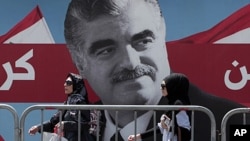After six years, the U.N.-backed Special Tribunal for Lebanon has issued four arrest warrants in the case of the assassination of former Prime Minister Rafik Hariri. Additional indictments are still possible. Skeptics wonder whether any individuals will ever be brought to justice, leaving others to question whether a lack of justice will dim Rafik Hariri’s political legacy. In Beirut, the "experts"’ and the "street" do not necessarily agree.
The sun is setting on another hot summer day, painting the horizon a deep pink as it appears to sink into the Mediterranean. Beirutis venture out into the cooler temperatures for their evening exercise along the same stretch of seafront where Rafik Hariri and 22 others were killed by a massive truck bomb in 2005.
Not far from here is the sparkling city center his company, Solidere, built from the rubble of a 15-year-long civil war. But the collapse of his son Saad's government in January and its replacement by one led by the Iranian- and Syrian-backed Hezbollah has some analysts questioning whether the sun may be setting on the Hariri family's political legacy.
Supporters disappointed
Lebanese American University political science professor Imad Salamey says some Hariri supporters felt let down by Saad Hariri's apparent willingness to make a deal with Hezbollah.
It was brokered by the Syrians and the Saudis, to abandon the U.N.-backed tribunal probe in exchange for Hezbollah consolidating its weapons with the Lebanese army's.
Salamey says Hariri acknowledged his constituent's disappointment in a recent televised interview.
“He admitted that his position cost him a lot of support and many people felt betrayed. But what he had to deal with is, in his terms, is the interest of the country and the achievement of national consensus and look for the future of the country,” he said.
Salamey says Hariri was willing to sacrifice justice for the greater good of the country, but that when the deal failed to go through because of alleged Hezbollah opposition, he decided he had to hold strong to his original position of seeking justice through the Tribunal.
Safety concern
For the last two months, Hariri has lived at his Paris home, saying there are threats against his safety in Lebanon. American University in Beirut political science professor Hilal Khashan says his absence under such circumstances contributes to him looking weak.
“The fact that after his ouster from office of prime minister he chose to leave Lebanon and claimed that his life was in danger, that did not sit well with the Lebanese Sunni community," said Khashan. "Just imagine if President Obama receives a life threat, would he leave the U.S.? This has not worked in his favor. A strong leader does not abandon his community and his constituency.”
But along the waterfront, people identifying themselves as Sunnis did not necessarily agree with the experts.
"A man of integrity"
Saleh Dabbagh, 51, a retired businessman, applauds Hariri’s willingness to put national interests ahead of satisfying his personal desire for justice. He notes that the majority of Lebanon’s Sunni community supports who he says is a man of integrity.
“You can see the good in his heart," he said. "Just look at him. He's a smiley one, he is a good one, good heart. And especially he is Lebanese, excuse me, not Syrian, not Iranian, he is Lebanese.”
Khaled, 42, a driver, says Hariri had no choice but to leave the country in the face of numerous security threats.
He adds that among Sunni political figures, Hariri is doing the most to help his constituents and there is no one who could replace him.
At a coffee shop in the mainly Sunni neighborhood of Tareek el-Jdeideh, men discuss politics as they smoke nargilehs and play cards. A small framed photo of the elder Hariri hangs in a corner.
Abdulrahman Khalil, 85, says Saad Hariri never really wanted to be prime minister in the first place, he only took on the job because his father was killed.
He says Hariri will come back to Lebanon, but he does not know if it will be as prime minister, but certainly as an important political figure leading his own party, the Future Movement and the Sunnis.
Syria's Assad remains key player
The analysts say it will likely take a regime change in neighboring Syria, now facing fierce anti-government protests, for Hariri to return to power.
For decades, Syria reigned in Lebanon, until they withdrew their troops in the wake of Rafik Hariri’s murder. But Damascus is again exerting its influence through the new government which is controlled by its close ally, Hezbollah.
Salamey says if Syrian President Bashar al-Assad is toppled, that could improve the political fortunes of both Lebanese Sunnis and Saad Hariri.
“If the Alawite regime in Syria collapses and then you have a greater power shifting in favor of the Sunnis in Syria, that will definitely strengthen Sunnis in Lebanon, and will tilt the balance in their favor against Shiites, and particularly Hezbollah. So that will help Hariri in that regard,” said Salamey.
Khashan agrees, noting that as long as Assad hangs on, Hariri's political prospects are dim.
“If the situation in Syria shifts in another direction, then Hariri will stand to be a major beneficiary. If Assad holds on to power you may say goodbye to him,” said Khashan.
In the meantime, Hariri shows no signs of abdicating his role in Lebanese politics, staying active through his Future movement and saying he plans to return to the country soon.
Hariri Clan Political Legacy at Stake in Tribunal Fallout




